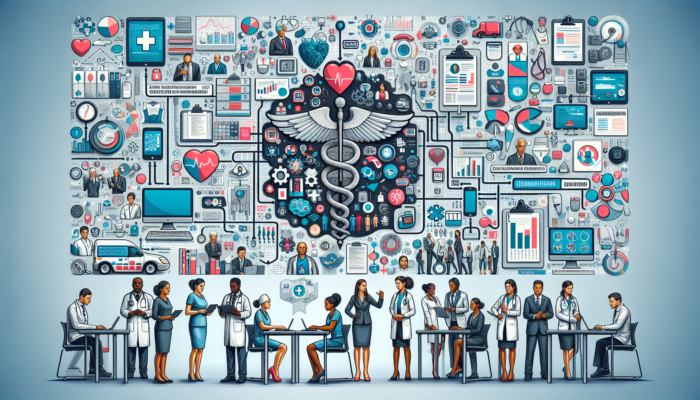Medical Billing & Coding: The Essential Pair in Healthcare
In the constantly evolving realm of healthcare, the disciplines of medical billing and coding, alongside medical transcription, are integral to ensuring seamless operations and optimal patient care. These two professions, although they serve distinct functions, are closely interconnected, representing an essential partnership that supports healthcare providers, insurance companies, and patients alike. This article will explore the complexities of medical billing, coding, and transcription, emphasising their significance and the necessary skills that lead to success in these vital fields.
Comprehensive Insights into Medical Billing and Coding
Medical billing and coding are crucial administrative processes in the realm of healthcare reimbursement and record-keeping. Specifically, medical coding involves the assignment of standardised codes to a variety of medical procedures, diagnoses, and treatments, while medical billing centres on the processes of preparing and submitting claims to insurance companies and other payers to facilitate payment. Both roles require a deep understanding of healthcare operations to ensure that all claims are processed correctly and efficiently, thereby supporting the financial health of healthcare providers.
Key Responsibilities of Medical Coders in Healthcare

Medical coders play an essential role in the healthcare system by meticulously reviewing patient medical records and converting this information into standardised codes. These codes are critical for various functions, such as billing, insurance claims, and statistical analysis. By assigning codes accurately, medical coders ensure that healthcare providers receive appropriate reimbursement for the services they deliver, which is vital for maintaining the sustainability of healthcare institutions.
To thrive in the field of medical coding, professionals must possess a thorough knowledge of medical terminology, anatomy, physiology, and disease processes. They also need to stay abreast of the latest coding guidelines and regulations. Common coding systems utilised in this profession include the International Classification of Diseases (ICD), Current Procedural Terminology (CPT), and the Healthcare Common Procedure Coding System (HCPCS), all of which require ongoing education and attention to detail.
The role of medical coders is pivotal in ensuring accurate and efficient billing processes. They are tasked with interpreting complex medical documentation and assigning the correct codes that encapsulate the diagnoses, treatments, and procedures performed. Their diligence guarantees healthcare providers receive the appropriate payments and that claims are processed without unnecessary delays.
To produce comprehensive and precise coding, medical coders frequently engage in extensive research and analysis of medical records. They may need to consult with healthcare providers and collaborate with other members of the healthcare team to ensure that they capture all relevant information accurately. Their keen attention to detail and analytical skills are indispensable in converting medical information into codes that accurately reflect the services rendered.
Essential Functions of Medical Billers in the Healthcare Ecosystem
Conversely, medical billers focus on transforming the coded information into billable claims. They bear the responsibility of ensuring that claims are completed accurately and submitted to insurance companies and other payers. Additionally, medical billers manage any denials or rejections, striving to resolve these issues to secure appropriate reimbursement for the healthcare services provided.
Success in the field of medical billing requires professionals to have a robust understanding of insurance policies, reimbursement procedures, and the intricacies of the claim submission process. Proficiency in medical coding is equally important, as it enables billers to accurately interpret the coded information and efficiently complete the billing process.
Medical billers are crucial in ensuring that healthcare providers receive timely and precise reimbursement for the services they offer. They meticulously review the coded information to ensure alignment with the services documented in the patient’s medical records. This comprehensive review includes verifying that the codes accurately reflect the diagnoses, treatments, and procedures performed, as well as ensuring all necessary supporting documentation is included with each claim.
In addition to submitting claims, medical billers are tasked with addressing denials or rejections from insurance companies. This aspect of their role demands strong problem-solving and analytical skills to identify and rectify any issues that may have contributed to the denial. They often need to communicate effectively with healthcare providers, insurance companies, and patients to gather additional information or clarify discrepancies, thereby facilitating successful resubmission and processing of claims.
Understanding the Critical Role of Medical Transcription
Medical transcription involves the conversion of audio recordings made by healthcare professionals into written reports. These reports become a vital component of the patient’s medical record, serving as essential documentation that supports diagnosis, treatment, and future reference. The work of medical transcriptionists is pivotal in maintaining precise and detailed medical records, which promotes efficient patient care and aids healthcare providers in making informed clinical decisions.
The Integral Role of Medical Transcriptionists in Healthcare

Medical transcriptionists are responsible for listening to audio recordings made by doctors, nurses, or other healthcare professionals and transcribing these into written reports. This role necessitates exceptional listening skills, meticulous attention to detail, and a sophisticated understanding of medical terminology, enabling them to accurately capture the nuances of the spoken word.
These professionals play a vital role in ensuring the integrity of medical records. They must diligently listen to the audio recordings and transcribe all information accurately, ensuring that no details are overlooked or misinterpreted. This task requires a deep familiarity with medical terminology and the ability to decipher various accents, speech patterns, or background noise that may be present in the recordings.
In addition to transcribing, medical transcriptionists frequently collaborate with healthcare providers to clarify any ambiguous or unclear dictations. This partnership ensures that the written reports are as accurate and complete as possible, which is crucial for the continuity of patient care. They may need to reach out to healthcare professionals for clarification on specific terms, medications, or procedures to ensure that the medical records accurately reflect the intended information.
Furthermore, medical transcriptionists must be adept at using transcription software and upholding patient confidentiality. They are required to comply with strict privacy regulations and ensure that patient information remains protected throughout the transcription process. This includes securely storing and transmitting the transcribed reports while adhering to protocols designed to maintain data security and privacy.
Exploring the Interconnection of Medical Billing, Coding, and Transcription
Although medical billing and coding and medical transcription are distinct professions, they are intricately linked in numerous ways. Accurate medical coding is fundamental for effective medical billing, as the coded information underpins the entire claim submission process. Without proper coding, medical billers may face significant challenges in processing claims, which can lead to delays in reimbursement for healthcare providers.
Moreover, medical transcriptionists play a supportive role in the coding process by providing detailed and precise medical reports. These reports serve as a valuable resource for medical coders, enabling them to assign appropriate codes based on the diagnoses, treatments, and procedures documented in the transcription reports.
Additionally, medical coders often depend on medical transcriptionists to clarify any unclear or incomplete dictations, ensuring that the coded information is as accurate and comprehensive as possible. This collaboration is essential for maintaining the integrity of the coding process and supporting the smooth operation of healthcare services.
The interplay between medical billing and coding and medical transcription underscores the necessity of precise and detailed documentation within the healthcare industry. The partnership between these professions fosters timely reimbursement for healthcare providers, facilitates smooth claims processing, and ensures that accurate medical records are maintained.
By working in tandem, professionals in medical billing, coding, and transcription enhance the overall efficiency and effectiveness of the healthcare system. Their collaboration streamlines processes, improves patient care, and supports informed decision-making by healthcare providers.
Essential Skills for Success in Medical Billing, Coding, and Transcription
Both medical billing and coding and medical transcription necessitate specialised skills and knowledge. To thrive in these professions, individuals must cultivate the following competencies:
- Proficiency in medical terminology, anatomy, and physiology: A robust foundation in medical knowledge is essential for accurately interpreting and translating medical information.
- Exceptional attention to detail and accuracy: Both medical billing and coding and medical transcription demand a high level of precision to ensure that information is recorded and translated correctly.
- Strong analytical and problem-solving skills: Professionals in these fields must effectively analyse complex medical information and identify any discrepancies or issues that may arise.
- Knowledge of coding guidelines and regulations: Keeping up-to-date with the latest coding guidelines and regulations is crucial to ensure compliance and accuracy in medical billing and coding.
- Familiarity with billing and reimbursement procedures: Understanding the intricacies of insurance policies, reimbursement processes, and claim submission is necessary for success in medical billing.
- Proficiency in using coding and transcription software: Efficient use of coding and transcription software is essential for completing tasks accurately and promptly.
- Effective communication and collaboration skills: Both medical billers and transcriptionists must be able to communicate effectively with healthcare providers, insurance companies, and other stakeholders to clarify information and resolve issues.
- Adherence to patient confidentiality and privacy regulations: Protecting patient information and maintaining privacy is paramount in both medical billing and coding and medical transcription.
Continuous education and staying informed about industry changes and advancements are also crucial for success in these rapidly evolving fields. Professionals engaged in medical billing, coding, and transcription must actively seek to expand their knowledge and skills to meet the ever-evolving demands of the healthcare industry.
The Indispensable Nature of Medical Billing, Coding, and Transcription in Healthcare

Medical billing and coding, along with medical transcription, are fundamental components of the healthcare system. The accurate coding of medical procedures and the translation of voice recordings into written reports significantly enhance the efficiency of healthcare operations, reimbursement processes, and overall patient care.
By understanding the distinct roles and interconnections between medical billing and coding and medical transcription, healthcare providers can optimise their operations, ensure proper reimbursement, and maintain accurate medical records. The success of these professions heavily relies on the expertise, meticulous attention to detail, and commitment to continuous learning of the professionals involved, rendering them essential components of the healthcare ecosystem.
Frequently Asked Questions about Medical Billing, Coding, and Transcription
1. What is the role of medical coders?
Medical coders are tasked with reviewing patient medical records and converting this information into standardised codes. These codes are crucial for billing, insurance claims, and statistical analysis, ensuring that healthcare providers receive the appropriate reimbursement for their services.
2. What is the role of medical billers?
Medical billers focus on transforming coded information into billable claims. They ensure that claims are accurately completed and submitted to insurance companies, addressing any denials or rejections to secure appropriate reimbursement for healthcare providers.
3. What is the importance of medical transcription?
Medical transcription is the process where voice recordings made by healthcare professionals are converted into written reports. This process ensures the maintenance of accurate and detailed medical records, promotes efficient patient care, and aids healthcare providers in making well-informed decisions.
4. How do medical billing and coding and medical transcription interconnect?
Accurate medical coding is fundamental for effective medical billing, as it forms the basis for claim submission. Medical transcriptionists provide detailed reports that serve as crucial information for medical coders, enabling precise coding based on diagnoses, treatments, and procedures. The collaboration between these professions fosters efficient healthcare operations.
Originally posted 2023-04-26 07:35:29.


